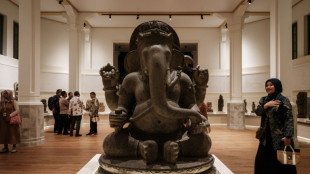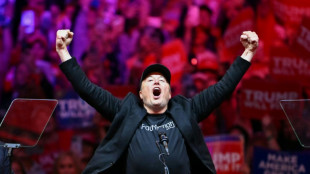
-
 Ski great Vonn finishes 14th on World Cup return
Ski great Vonn finishes 14th on World Cup return
-
Scholz visits site of deadly Christmas market attack

-
 Heavyweight foes Usyk, Fury set for titanic rematch
Heavyweight foes Usyk, Fury set for titanic rematch
-
Drone attack hits Russian city 1,000km from Ukraine frontier

-
 Former England winger Eastham dies aged 88
Former England winger Eastham dies aged 88
-
Pakistan Taliban claim raid killing 16 soldiers

-
 Pakistan military courts convict 25 of pro-Khan unrest
Pakistan military courts convict 25 of pro-Khan unrest
-
US Congress passes bill to avert shutdown

-
 Sierra Leone student tackles toxic air pollution
Sierra Leone student tackles toxic air pollution
-
German leader to visit site of deadly Christmas market attack

-
 16 injured after Israel hit by Yemen-launched 'projectile'
16 injured after Israel hit by Yemen-launched 'projectile'
-
Google counters bid by US to force sale of Chrome

-
 Russia says Kursk strike kills 5 after Moscow claims deadly Kyiv attack
Russia says Kursk strike kills 5 after Moscow claims deadly Kyiv attack
-
Cavaliers cruise past Bucks, Embiid shines in Sixers win

-
 US President Biden authorizes $571 million in military aid to Taiwan
US President Biden authorizes $571 million in military aid to Taiwan
-
Arahmaiani: the Indonesian artist with a thousand lives

-
 Indonesians embrace return of plundered treasure from the Dutch
Indonesians embrace return of plundered treasure from the Dutch
-
Qualcomm scores key win in licensing dispute with Arm

-
 Scientists observe 'negative time' in quantum experiments
Scientists observe 'negative time' in quantum experiments
-
US approves first drug treatment for sleep apnea

-
 US drops bounty for Syria's new leader after Damascus meeting
US drops bounty for Syria's new leader after Damascus meeting
-
Saudi man arrested after deadly car attack on German Christmas market

-
 'Torn from my side': horror of German Christmas market attack
'Torn from my side': horror of German Christmas market attack
-
Bayern Munich rout Leipzig on sombre night in Germany

-
 Tiger in family golf event but has 'long way' before PGA return
Tiger in family golf event but has 'long way' before PGA return
-
Pogba wants to 'turn page' after brother sentenced in extortion case

-
 Court rules against El Salvador in controversial abortion case
Court rules against El Salvador in controversial abortion case
-
French court hands down heavy sentences in teacher beheading trial

-
 Israel army says troops shot Syrian protester in leg
Israel army says troops shot Syrian protester in leg
-
Tien sets-up all-American NextGen semi-final duel

-
 Bulked-up Fury promises 'war' in Usyk rematch
Bulked-up Fury promises 'war' in Usyk rematch
-
Major reshuffle as Trudeau faces party pressure, Trump taunts

-
 Reggaeton star Daddy Yankee in court, says wife embezzled $100 mn
Reggaeton star Daddy Yankee in court, says wife embezzled $100 mn
-
Injured Eze out of Palace's clash with Arsenal

-
 Norway's Deila named coach of MLS Atlanta United
Norway's Deila named coach of MLS Atlanta United
-
Inter-American Court rules Colombia drilling violated native rights

-
 Amazon expects no disruptions as US strike goes into 2nd day
Amazon expects no disruptions as US strike goes into 2nd day
-
Man Utd 'more in control' under Amorim says Iraola

-
 Emery insists Guardiola 'still the best' despite Man City slump
Emery insists Guardiola 'still the best' despite Man City slump
-
US confirms billions in chips funds to Samsung, Texas Instruments

-
 English Rugby Football Union chairman quits amid pay row
English Rugby Football Union chairman quits amid pay row
-
Major reshuffle as Trudeau faces party pressure, Trump attacks

-
 Gatland remains as Wales boss but must 'change fortunes on the pitch'
Gatland remains as Wales boss but must 'change fortunes on the pitch'
-
Argentina's dollar craze cools under greenback-loving Milei

-
 Medici secret passageway in Florence reopens after refit
Medici secret passageway in Florence reopens after refit
-
Anger after Musk backs German far right

-
 Arteta says 'best is yet to come' as he marks five years at Arsenal
Arteta says 'best is yet to come' as he marks five years at Arsenal
-
Pereira happy to achieve Premier League 'target' with Wolves

-
 'Dark lull' in German energy transition sparks political debate
'Dark lull' in German energy transition sparks political debate
-
Russian skaters allowed to compete as neutrals in 2026 Winter Olympics


'Kill him first': Israel eyes top level targets
After the killing of Hezbollah's leader in Lebanon, Prime Minister Benjamin Netanyahu boasted Israel had "settled the score". But the legacy of Israel's past targeted killings calls into question how much will actually change.
Far from bringing respite to Israelis, Hassan Nasrallah's death led to an Iranian missile attack on Israel, as Tehran sought to avenge its protege in Lebanon and an Iranian general killed alongside him.
Israel has vowed to retaliate, with analysts saying it is only a matter of time.
Hezbollah, created in 1982 with Iranian help after Israel's invasion of Lebanon, has taken a major hit from Israeli attacks that have killed Nasrallah and much of his top brass.
Yet past Israeli operations show the possible limits of this strategy.
When Israel killed Nasrallah's predecessor, Abbas al-Musawi, in 1992, it did not weaken Hezbollah.
Nasrallah, then 32, replaced him and eventually became, in Netanyahu's words, "not just another terrorist" but "the terrorist".
Israel was also linked to the 2008 killing of top Hezbollah commander Imad Mughniyeh in a Damascus car bombing.
That killing, however, "didn't make Hezbollah's military operations necessarily weaker", said David Wood, senior analyst for the International Crisis Group.
"It didn't make it harder to recruit people to join Hezbollah. If anything, Hezbollah continued to develop its military programme."
This time, Israel's strikes may prove more consequential, since they "decimated" Hezbollah's senior military leadership, said Wood, calling it "an unprecedented challenge" for the group.
- 'Wrath of God' -
Israel's policy of targeted killings began after the 1972 Munich Olympic Games, where Palestinian gunmen from the Black September group killed 11 Israelis.
In response, Israel launched "Wrath of God", an operation targeting leaders of Black September and the Palestine Liberation Organization.
This strategy evolved, with Israeli hits on top Hezbollah and Hamas operatives.
But there were also blunders, like the failed 1997 attempt to poison Hamas leader Khaled Meshaal in Amman, which soured Israel-Jordan ties, just a few years after they had made peace.
Israel was then forced to release Hamas spiritual leader Ahmed Yassin in exchange for two Israeli spies arrested by Jordan.
Since Hamas's October 7 attack, Israel has carried out several high-profile killings, including Hamas leader Ismail Haniyeh, Hezbollah commander Fuad Shukr, and now Nasrallah.
Israel claimed responsiblity for Shukr's death in south Beirut but has yet to confirm its role in Haniyeh's killing in Iran.
- 'Massive degrading' -
Netanyahu defended targeted killings days ago by quoting the Talmud, the central text of Judaism: "He who comes to kill you, rise up and kill him first."
For years up until the October 7 attack, Israel had mostly held its breath as Hezbollah and Hamas amassed formidable arsenals, said John Hannah of the Jewish Institute for National Security of America.
October 7 changed that, after Palestinian gunmen stormed across the border and staged an unprecedented attack on Israel that resulted in the deaths of 1,205 people, mostly civilians, according to an AFP tally based on Israeli official figures that include hostages killed in captivity.
The latest attacks on Hezbollah show "the doctrines of pre-emption and prevention have returned with a vengeance to Israel's national security" strategy, said Hannah.
"Israel is now engaged in a massive degrading of the military capabilities of both Hamas and Hezbollah," he added.
This week, Israel's military announced the launch of "limited" raids in south Lebanon against Hezbollah, which began firing on northern Israel in support of ally Hamas after the October 7 attack.
The announcement came after a week of deadly bombardment on Hezbollah strongholds around Lebanon.
Israel says its shift in focus to securing its northern front aims to ensure the safe return of more than 60,000 Israelis displaced from the border by Hezbollah cross-border strikes in the past year.
Within Israel, meanwhile, some have questioned whether Nasrallah's killing will help serve that purpose.
Yossi Melman, an intelligence commentator for the left-leaning Israeli daily Haaretz, said Nasrallah's death would only be a "game-changer" if it is followed by serious diplomatic efforts to end the fighting.
"Hezbollah, despite the heavy blows it has suffered, will keep targeting" northern Israel, said Melman, author of a history of Israeli espionage titled "Spies Against Armageddon".
"And as long as the shelling continues the evacuees will not return."
P.Mira--PC
